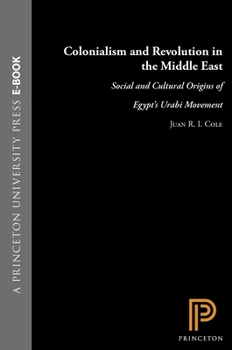Colonialism and Revolution in the Middle East: Social and Cultural Origins of Egypt's Urabi Movement
Select Format
Select Condition 
Book Overview
In this book Juan R. I. Cole challenges traditional elite-centered conceptions of the conflict that led to the British occupation of Egypt in September 1882. For a year before the British intervened, Egypt's viceregal government and the country's influential European community had been locked in a struggle with the nationalist supporters of General Ahmad al- Urabi. Although most Western observers still see the Urabi movement as a "revolt" of junior military officers with only limited support among the Egyptian people, Cole maintains that it was a broadly based social revolution hardly underway when it was cut off by the British. While arguing this fresh point of view, he also proposes a theory of revolutions against informal or neocolonial empires, drawing parallels between Egypt in 1882, the Boxer Rebellion in China, and the Islamic Revolution in modern Iran. In a thorough examination of the changing Egyptian political culture from 1858 through the Urabi episode, Cole shows how various social strata--urban guilds, the intelligentsia, and village notables--became "revolutionary." Addressing issues raised by such scholars as Barrington Moore and Theda Skocpol, his book combines four complementary approaches: social structure and its socioeconomic context, organization, ideology, and the ways in which unexpected conjunctures of events help drive a revolution.
Format:Hardcover
Language:English
ISBN:0691056838
ISBN13:9780691056838
Release Date:December 1992
Publisher:Princeton University Press
Length:360 Pages
Weight:1.60 lbs.
Dimensions:1.0" x 6.5" x 9.6"
Customer Reviews
0 rating





